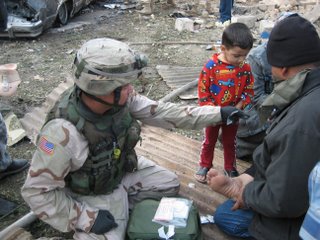 Ambassador Zalmay Khalilzad and Gen. George Casey both have proposed a security transfer to Iraqis within twelve to eighteen months that would include the demobilizing of militias, sharing oil revenues and a national compact among sectarian factions. As David Ignatius points out in this morning’s Washington Post, it all looks sensible on paper but in the real world the approach has not been working.
Ambassador Zalmay Khalilzad and Gen. George Casey both have proposed a security transfer to Iraqis within twelve to eighteen months that would include the demobilizing of militias, sharing oil revenues and a national compact among sectarian factions. As David Ignatius points out in this morning’s Washington Post, it all looks sensible on paper but in the real world the approach has not been working.One of the failures of this whole endeavor has been the failure for planning for the post Saddam Hussein Iraq. This only emphasizes the need for planning for the ultimate phasing out of foreign troops from Iraqi soil that will do the most to enhance stability and safety for the Iraqi people and the least amount of damage to U.S. interests. This will not be easy.
David Ignatius looks at the issue:
Some months ago, former national security adviser Zbigniew Brzezinski
was explaining to a senior Bush administration official his plan for a phased
withdrawal of U.S. troops from Iraq over 12 months, in consultation with the
Iraqis. "We're going to do the same thing," the senior official confided, "but
we're going to call it victory."
This week it became official: The Bush administration's Iraq policy
is no longer "stay the course" but, in the phrase of White House spokesman Tony
Snow, "a study in constant motion." The reality, as near as I can tell, is that
the administration isn't sure yet where to move after the November elections.
Nor are most of the administration's critics. Major newspapers carried
editorials or op-eds this week advocating some version of "change the course,"
but they were vaporous when it came to details.
*****
In the weeks after the election, the debate in Washington will
focus on two promising exit ramps. But it's important not to attach unrealistic
hopes to either one.
The first path is a more federal Iraq -- with power devolved to the
Shiite, Sunni and Kurdish regions. But this presupposes a national government
strong enough to formulate rules for, say, the sharing of oil revenue. If such a
national framework existed, Iraq wouldn't be such a mess in the first place.
Another tricky problem is stabilizing the Sunni areas that would be a potential
safe haven for terrorists. If the Iraqi army can't control these areas, the only
alternative may be, in effect, a Sunni militia drawn from the ranks of the
insurgency. U.S. officials have been meeting secretly outside Iraq with
insurgent leaders in an effort to draw them into such a framework.
The second exit ramp passes through Iran and Syria. Talking with
Tehran and Damascus could be helpful in stabilizing Iraq, but we should
recognize at the outset that their influence is limited -- and that it may carry
an unacceptable price. Iran's goal in Iraq is a decisive Shiite victory and
Sunni submission, but that's a formula for continuing civil war -- and in any
event, it's not an agenda the United States should endorse. Syria could be
helpful in curbing al-Qaeda in Iraq, but there are limits and drawbacks to
Syrian power -- as was clear during its long and brutal occupation of
Lebanon.
The real opportunity presented by the Baker-Hamilton process is
that it's bipartisan. To get most American troops out of Iraq over the next year
will require more patience at home, and a lot less partisan bickering. And our
politicians will need strong stomachs: They must manage an orderly retreat under
fire. There is a path out of this mess, but we will be lying if we call it
victory.
No comments:
Post a Comment